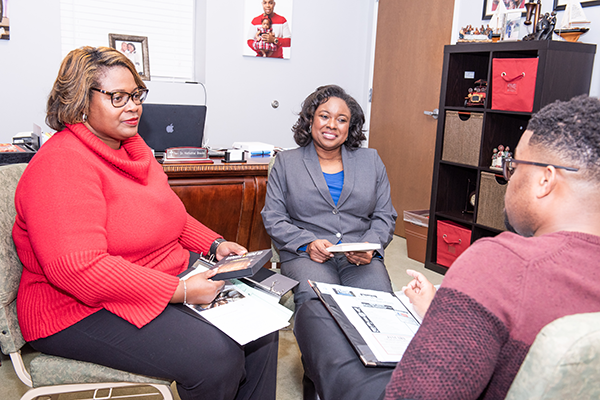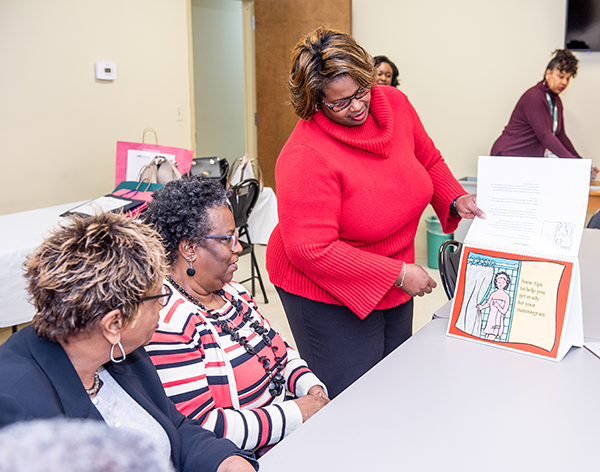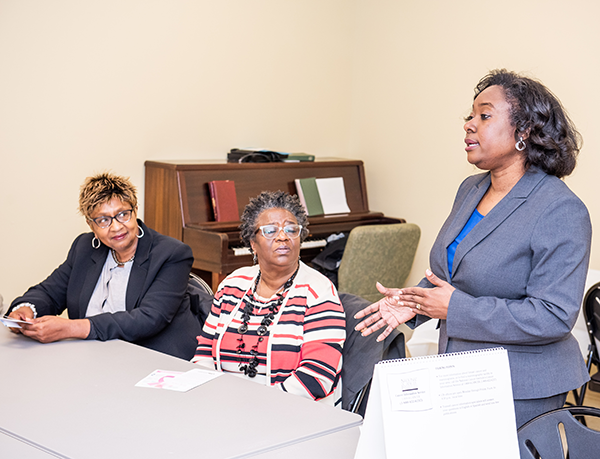Extending the Benefits of the Cancer Center to All in our State
By Beena Thannickal

The O’Neal Comprehensive Cancer Center has a long, rich history in addressing cancer health disparities; in fact, it has been recognized as one of the few cancer centers in the nation that effectively engages and has aproven track-record working with underserved populations.
In April of 2019, the outreach office officially changed its name to become the Office of Community Outreach and Engagement of the UAB O’Neal Comprehensive Cancer Center. This is not just a name change but a whole new approach of how to reach the community in an effective manner.
“This change reflects the expansion in the scope of our efforts to improve cancer outcomes and eliminate cancer disparities for all cancer patients and populations of Alabama,” says Ravi Bhatia, M.D., interim director of the O’Neal Cancer Center. “This enhanced effort in community outreach and engagement is essential to disseminate findings from our research and provide access to our clinical services within our community, and to make an impact in areas most relevant to the patients and populations we serve.
“As the only National Cancer Institute-designated comprehensive cancer center in Alabama, UAB has an obligation to address our state’s cancer burden,” says Bhatia.
In order to facilitate a more formal and integrated approach, Monica Baskin, Ph.D., professor in the UAB Division of Preventive Medicine, has been appointed as the inaugural associate director for the Cancer Center and now oversees the Office. She has a long history and strong professional background of research focused on reducing health disparities in the Deep South.
“Although cancer incidence and mortality overall are declining in all racial and ethnic groups in the United States, certain groups such as the African American community and those who live in rural communities,continue to be at increased risk of developing or dying from particular cancers,” says Baskin.
Alabama has the eighth highest cancer mortality rate inthe United States.
“Our vision is to improve cancer outcomes and eliminate cancer disparities for cancer patients and populations of Alabama so that everyone has a fair opportunity to lead a healthier life for as long as possible,” says Baskin. The Office will focus on scientific discovery, transdisciplinary engagement, linkage to patient care and education.
“We are still going to build upon what we have always done and done well, but our new focus is on the catchment area which is the entire state of Alabama. Our hope is to better understand the unique characteristics and needs of diverse populations in the state, recognizing that there are cancer disparities based on race/ethnicity, sex, rural residence, income and disability status across the state,” says Baskin.
For more than 20 years, the Cancer Center has utilized the community health advisors (CHA) model — using ‘natural helpers’ from the community to educate about cancer prevention and lifestyle modification. By training more than 1,700 CHAs, the Cancer Center has conducted community-based research, education and training to successfully decrease disparity in cancer outcomes in 22 counties in the Alabama Black Belt and Mississippi Delta.
“When we started, African American women in the Black Belt were 17 percent less likely than white women in the region to have regular mammograms. By the end of the program, the pattern had been dramatically altered,” says Claudia Hardy, MPA, program director of the Office of Community Outreach and Engagement.
“Initially we wanted to reduce cancer disparities by improving access and utilization of proven cancer interventions, and then over the years we added specific layers of community-based participatory research to the equation,” says Hardy. “What we know for sure is that the CHA model has been effective and proven its value at increasing awareness and reluctance to screenings in underserved communities.”
Like much of the country, it is never a simple or straightforward path when addressing cancer disparities. Poverty and a resultant lack of quality medical care in rural areas remains a problem. In Alabama, 18.4 percent of the population lives in poverty, and 32 of 67 counties are considered nonmetropolitan with populations ranging from less than 2,500 to 19,999.

As a result, the Office is currently focusing on outreach in counties that have not been historically targeted, for example, Walker, Talladega, Monroe, Madison, and Calhoun counties, where there have been limited outreach activities. It is also working to enhance communication and information-sharing to improve the impact of the research they are conducting in those areas.
Long-standing research has also shown that members of minority racial/ethnic groups are more likely to be poor and medically underserved. Furthermore, when it comes to cancer care, biological differences exist within each racial/ethnic group.
In Alabama, 68 percent of its 4.9 million population are white, 26.5 percent are black and 4 percent are Hispanic. Breast, prostate, lung and colon remain the most prevalent cancers here.
In order to combat the barriers that exist within these racial/ethnic groups, the Cancer Center has always had partnerships with many faith-based organizations, local municipalities, non-profit organizations, schools and other civic groups to provide information on early detection and screening. Most recently, based on research indicating that colorectal cancer is more common in African Americans, the Cancer Center has led awareness activities in local communities and promoted the National Cancer Institute’s Screen to Save program with state and regional partners. The program provides culturally tailored, evidence-based colorectal cancer information, education and screening resources for racially and ethnically diverse and rural communities nationwide.

In addition, the Office leads two initiatives focused on decreasing the lung cancer death rate in the state, the leading cause of cancer deaths in Alabama. The first is a partnership with the National African American Tobacco Prevention Network (NAATPN) that focuses on the elimination of tobacco-related disparities by raising awareness of the dangers of menthol and tobacco use by promoting prevention behaviors and screening programs. The second is the Alabama Lung Cancer Awareness, Screening and Education (ALCASE) program, which is a partnership with the GO2 Foundation that seeks to increase lung cancer screening among those at high risk for the disease.
“Our new charge is to identify ways to address the most critical factors in specific disparities in our state,” says Baskin. “We have begun the work of action planning and performing research specifically relevant to our catchment area. But we are also establishing partnerships with other health care delivery systems and state community agencies in order to decrease new cancer rates and cancer deaths among the populations within the catchment area.”
To that end, Baskin and her team have created a Community Advisory Board consisting of 15 leaders representing every region across Alabama, who provide input on strategic priorities most germane to the catchment area and support outreach and community efforts.
“This group helps us keep our finger on the pulse. They represent the voices of communities we serve and ensure bi-directional communication between the community and the Cancer Center,” says Baskin. The Office has recently recruited two scientists – Molly Richardson, Ph.D., MPH, and Meghan Tipre, BDS, MSPH,DrPH – to enhance their efforts in data collection and analysis, establishment of new community partnerships, and to conduct independent research related to cancer outreach and engagement within populations affected by health disparities.
“The Office of Community Outreach and Engagement is committed to extending the legacy of the O’Neal Comprehensive Cancer Center as a national leader in translational and community-based cancer research and patient-centered cancer care. Our expanded office, new Community Advisory Board, and the ongoing commitment and collaboration between our office and the entire Cancer Center will propel us to reaching our ultimate goal of the elimination of cancer as a major public health problem in Alabama and beyond,”says Baskin.
Share a Memory of the O'Neal Cancer Center
If you’re a physician, nurse, researcher, trainee, staff member, administrator or volunteer at the UAB O’Neal Comprehensive Cancer Center, our communications team wants to know what you think is most interesting, pivotal, or noteworthy about the O’Neal Cancer Center’s last 50 years. Submit a memory in honor of the Cancer Center’s 50th anniversary, and we may share it in our social media channels!




